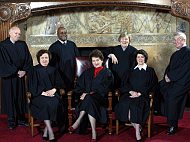5/13/2009
New York Appeals Court Strikes Down Warrantless GPS SpyingRuling by New York Court of Appeals calls the warrantless GPS tracking of motorists a massive invasion of privacy.

The New York State Court of Appeals yesterday disagreed with Wisconsin's second-highest court in ruling that police may not use Global Position System (GPS) tracking devices without a warrant. A divided New York court found that the state police violated the law when officers placed a device known as Q-Ball on the van belonging to Scott C. Weaver on the morning of December 21, 2005. This device wirelessly transmitted an up-to-the-minute history of the vehicle's every move over the course of sixty-five days. Police never obtained a warrant for the surveillance, but the evidence obtained was used -- along with the testimony of a witness -- to convict Weaver of participating in a K-Mart burglary.
In evaluating the legal situation, the New York court -- like its Wisconsin counterpart -- turned to US v. Knotts, a 1983 US Supreme Court case involving a modest beeper-like transmitter. The New York judges departed from the reading of the Wisconsin judges by distinguishing the powerful capabilities of modern surveillance.
"Knotts involved the use of what we must now, more than a quarter of a century later, recognize to have been a very primitive tracking device," Chief Judge Jonathan Lippman wrote for the 4-3 majority. "The device was, moreover, used in a focused binary police investigation for the discreet purpose of ascertaining the destination of a particular container of chloroform. And, in this application, during the single trip from the place where the chloroform was purchased to the Knotts cabin, the beeper was fairly described by the court as having functioned merely as an enhancing adjunct to the surveilling officers' senses; the officers actively followed the vehicle and used the beeper as a means of maintaining and regaining actual visual contact with it. The technology was, in this context, not unconvincingly analogized by the court to a searchlight, a marine glass, or a field glass."
Such a narrow use of technology could not be compared, the court argued, with the broad power promised by a GPS unit with a tracking memory and precision beyond anything a police department could do with live surveillance.
"GPS is not a mere enhancement of human sensory capacity, it facilitates a new technological perception of the world in which the situation of any object may be followed and exhaustively recorded over, in most cases, a practically unlimited period," Lippman wrote. "The potential for a similar capture of information or 'seeing' by law enforcement would require, at a minimum, millions of additional police officers and cameras on every street lamp."
The majority found that allowing police unsupervised access to this powerful technology was not "compatible with any reasonable notion of personal privacy or ordered liberty." It also found that the most troubling aspect was the ease with which police could create a profile of the political, religious and social habits of any target. The US Supreme Court in 1983 even suggested that the Knotts ruling may have been different had the technology allowed for "twenty-four hour surveillance of any citizen in this country... without judicial knowledge or supervision."
The New York majority also struck back against the well-worn concept of "diminished expectation of privacy" that is so often used as an excuse to intrude on the rights of the motoring public.
"It is... quite another (thing) to suppose that when we drive or ride in a vehicle our expectations of privacy are so utterly diminished that we effectively consent to the unsupervised disclosure to law enforcement authorities of all that GPS technology can and will reveal," Lippman wrote. "We, of course, have held in reliance upon our own Constitution that the use of a vehicle upon a public way does not effect a complete surrender of any objectively reasonable, socially acceptable privacy expectation."
The majority concluded that it was absurd for the state to argue that no search occurred in Weaver's case. It also found no possible "emergency" exception could apply to a surveillance operation that lasted sixty-five days. To prevent the possibility of being overturned by a federal court, the majority made clear that because the US Supreme Court has not ruled on GPS that it was relying on the privacy protections of the New York Constitution.
"Without judicial oversight, the use of these powerful devices presents a significant and, to our minds, unacceptable risk of abuse," Lippman concluded. "Under our state
Constitution, in the absence of exigent circumstances, the installation and use of a GPS device to monitor an individual's whereabouts requires a warrant supported by probable cause."
The full text of the decision is available in a 70k PDF file at the source link below.


